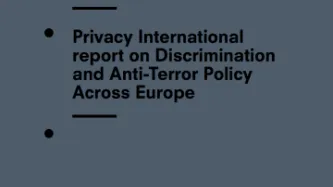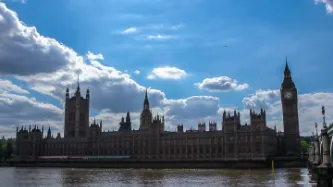Search
Content type: Press release
At 12.45pm today, Wikileaks released hundreds of brochures, presentations, marketing videos and technical specifications exposing the inner workings of the international trade in surveillance technologies. Many of these documents were gathered by PI’s Eric King while undercover at industry-only conferences and trade shows in London, Paris and Washington DC.
Mr King joined Julian Assange, security researcher Jacob Appelbaum, Stefania Maurizi of Italian news weekly L’Espresso, Jean-Marc Manach…
Content type: News & Analysis
Prime Minister David Cameron may not be quite the “pitiless blank-eyed hell wraith” Charlie Brooker portrayed in yesterday’s Guardian, but he does have some pretty frightening ideas about the Internet. This morning the Prime Minister announced, at a meeting with the Christian charity Mother’s Union, that four of the UK’s biggest ISPs will henceforth require users to opt in if they want to view pornographic material – thereby creating a commercially-owned and controlled database of…
Content type: Press release
Privacy International today published documentation that establishes a deliberate cover-up by the UK Information Commissioner’s Office (ICO) of a failure to uphold its responsibility to enforce the Data Protection Act.
A request under the Freedom of Information Act by PI and No-CCTV has revealed a conflict of interest in the ICO’s mandate and a fundamental failure of process within the Office. The material disclosed proves that the ICO conspired to delay the FOIA request, and attempted to…
Content type: News & Analysis
The second 2011 meeting of the APEC Privacy Subgroup took place in San Francisco in mid September, and finalised the package of documents that comprise the Cross Border Privacy Rules (CBPR) system. Endorsed by the parent Electronic Commerce Steering Group (ECSG), these will now go forward for ratification by Ministers in Hawaii in November, and subsequent implementation. The Subgroup’s 2012 Work Plan envisages establishment of the Joint Oversight Panel (JoP), commencement of…
Content type: News & Analysis
At the moment there is much anger about a UK Border Official who, according to the BBC, relaxed "identity checks on non-EU nationals" over the summer. This 'relaxation' then was claimed to have placed the UK at risk because names of visitors were not checked against 'watchlists'. This news is unsurprising in some respects, and quite shocking in others.
The controversy centres on the call to temporarily suspend checking the e-passports of individuals from outside of the EU…
Content type: News & Analysis
An international alliance of organisations and individuals from 27 countries has lodged a petition calling on the Council of Europe to start an indepth survey on the collection and storage of biometric data by member states.
European governments are increasingly demanding storage of biometric data (fingerprints and facial scans) from individuals. These include storage on contactless 'RFID' chips in passports and/or ID cards. Some are going even further by implementing…
Content type: News & Analysis
2011 is supposed to be the year that the APEC pathfinder projects on Cross Border Privacy Rules (CBPR) deliver a functional system for businesses to be certified for transfer of personal information between participating APEC economies.
After the last round of APEC privacy meetings in Washington DC on 1-3 March, this prospect is looking increasingly remote. Even the basic set of documentation and processes required for the process of self-certification and assessment of businesses has yet to…
Content type: News & Analysis
Skype has consistently assured that it protects its users and their communications. Having reviewed the company's technology and policies we have grounds for concern about Skype's overall level of security, and we believe there are a number of questions to which the company must respond. Skype's misleading security assurances continue to expose users around the world to unnecessary and dangerous risk. It's time for Skype to own up to the reality of its security and to take a leadership…
Content type: Press release
Privacy International’s Director-General Simon Davies has today written to Prime Minister David Cameron and Creativity Software CEO Richard Lee following revelations that Kingston-based Creativity sold a location-tracking system to Iran.
Mr Davies expressed his disappointment that the Coalition has taken no steps whatsoever to stop the export from Britain of surveillance technology to repressive regimes in the Middle East and North Africa, where it is used as a tool of political control…
Content type: News & Analysis
Not since the 1990s has the internet been so exciting. With its use by political activists and journalists around the world, we can now again entertain the discussions that the internet brings freedom. Digital data traverses routers with little regard to national boundaries and so traditional constraints not longer apply. So it is no surprise that protestors on the streets of Tehran or Cairo are using the internet to organise. We like to believe in the freedom of the internet again, after…
Content type: News & Analysis
Privacy International and EPIC praised a vote today in the European Parliament today that rejected the transfer of finacial records to the United States under an interim agreement. A resolution to reject the deal passed 378-16, with 31 abstentions. Members of the parliament stated the proposed agreement lacked adequate privacy safeguards, and was a disproportionat response to US concerns about terrorism that also lacked reciprocity.
Simon Davies, Director General of Privacy International…
Content type: News & Analysis
Following an extensive campaign by Privacy International and our network of groups in the United Kingdom, the UK Government has decided to abandon its current plans for data sharing legislation.
The government has announced that it will immediately abandon clause 152 of the Coroners and Justice Bill, following on from an open letter that Privacy International sent to the Justice Secretary earlier this week.
As the Sunday Telegraph observed, the eloquence of the letter together with the…
Content type: News & Analysis
Two months ago, the UK Borders Agency began fingerprinting foreign children over six years old, from outside the European Economic Area and resident in Britain. At the time Jacqui Smith was congratulated for her tough line on issuing identity cards to foreign residents and no one, not even parliament, noticed that the biometric requirements applied to children of six. And parliament didn't know because it was never asked to approve the policy.
Nowhere in the world are you more powerless than…
Content type: News & Analysis
Under the Terrorism Act 2000, police agencies in the UK have the power to stop and search within ‘security zones’ as established under order by the Home Secretary. Since February 2001, London has been designated as a security zone.
When this power was used in 2003 at a London protest against the arms trade, the protestors appealed to the courts on privacy grounds. The UK House of Lords ruled that although a stop and search in public was possibly an interference under Article 8(1) of the ECHR,…
Content type: News & Analysis
Privacy International's recent complaint to the UK Information Commissioner has threatened to bring to a halt an imminent plan to fingerprint all domestic and international passengers departing from Heathrow's Terminal 1 and Terminal 5, due to begin on March 27th. The British media is reporting that in response to PI's complaint, the Information Commissioner has advised that passengers should only accept fingerprinting "under protest" until our complaint is resolved.
The prospect of…
Content type: News & Analysis
Privacy International and the American Civil Liberties Union have appealed to the Council of the European Union, the European Commission, the European Parliament, and privacy commissioners in 31 countries across Europe to repeal the agreement between the EU and the US on passenger data transfers. We argue that, with the recent disclosure of the 'Automated Targeting System' being used by the US Department of Homeland Security, the US has violated both American law and the agreement with the EU…
Content type: News & Analysis
At its last session on November 21st and 22nd 2006, the Article 29 Working Party has again been dealing with the SWIFT case and has unanimously adopted Opinion 128 on its findings in this case.
In this Opinion, the Article 29 Working Party emphasizes that even in the fight against terrorism and crime fundamental rights must remain guaranteed. The Article 29 Working Party insists therefore on the respect of global data protection principles.
SWIFT is a worldwide financial messaging service…
Content type: Press release
Privacy International (PI) today filed additional complaints with authorities in Japan, Israel, Korea, Taiwan, Province of China, Thailand and Argentina. On June 27th PI filed simultaneous complaints with Data Protection and Privacy regulators in 32 countries concerning recent revelations of secret disclosures of records from SWIFT to US intelligence agencies.(1)
The disclosures involve the mass transfer of data from SWIFT in Europe to the United States, and possibly direct access by US…
Content type: News & Analysis
Booz Allen Hamilton, Inc., a prominent defence and intelligence consulting and engineering firm, has been hired as an outside "independent" auditor of the CIA and Treasury Department's Terrorist Finance Tracking Program ("TFTP"), which monitors banking transactions made through the Society for Worldwide Interbank Financial Telecommunication (SWIFT). Though Booz Allen's role is to verify that the access to the SWIFT data is not abused, its relationship with the U.S. Government calls its…
Content type: News & Analysis
Dear Mr Schrank,
I am writing with regard to the current controversy over the private arrangement between SWIFT and the U.S. Government that facilitates the extradition of confidential financial transaction data from SWIFT to U.S. authorities. You will be aware that Privacy International contends that this arrangement breaches privacy and data protection law, and we have lodged complaints with regulatory authorities in 38 countries.
In my many discussions with SWIFT officials over the past…
Content type: News & Analysis
The Criminal Justice Act 2003 further widens the circumstances in which a non-intimate sample may be taken from an individual. The Act merely requires that in order to take a non-intimate sample without consent, a person is arrested for a recordable offence - a significant advancement on the requirement that the individual was charged with a recordable offence and one that will encompass countless more individuals.
Section 10 of the CJA 2003 alters the taking of non-intimate samples, but in a…
Content type: News & Analysis
A campaign to eliminate the DNA profiles of 24,000 innocent juveniles from the database has been instigated by a Conservative Member of Parliament after a lengthy battle to remove the record of a concerned constituent’s son who was arrested as a result of misidentification. The National DNA Database currently holds the records of 750,000 juveniles – some of whom have been convicted of offences but many of whom were only charged, cautioned, questioned or were mere witnesses to incidents.
The…
Content type: News & Analysis
The UK currently maintains the largest DNA Database in the world and is encouraging other governments to implement similar systems in their respective countries. Using international organisations such as Interpol, participant governments will be able to share and exchange the DNA profiles of their citizens subject to vague legislative provisions, such as 'the interests of crime detection and prevention'.
Background
The successful prosecution of a serial sex offender in 2004 led to…
Content type: News & Analysis
The most significant amendment of the Criminal Justice and Police Act 2001 (hereafter 'CJPA') is the amendment to the circumstances in which samples may be retained. The Act allows for retention of samples even where charges are dropped or the individual is cleared of the offence. It also allows for such samples to be used for (future) purposes related to the detection and prevention of crime, both in the UK and abroad.
In relation to the taking of samples, the CJPA 2001 amends PACE by…
Content type: News & Analysis
The Criminal Justice and Public Order Act 1994 was the first serious expansion of the powers to take samples, particularly non-intimate samples – which included mouth swabs and saliva in addition to hair samples: both of which provide DNA information. Such samples could be taken without the consent of the individual if he is charged with a recordable[1] offence, a significant advance on the earlier requirement that the individual is charged with a 'serious arrestable offence'.
During the…
Content type: News & Analysis
Although DNA matching was first used to catch an offender in 1987, the Police and Criminal Evidence Act 1984 is instrumental in defining police treatment of suspects in the early stages of an investigation. Despite the fact that the Act has been amended on numerous occasions since its inception, analysis of the original legislation provides the starting point to map out the development and expansion of the circumstances in which samples containing DNA can be taken from individuals.
This early…
Content type: News & Analysis
Privacy International has joined forces with dozens of other human rights and civil liberties organizations around the world to ask the European Parliament to reject a Directive that would seriously compromise personal freedom in the EU. Below is the text of the letter to Members of the European Parliament, and the pdf is also available.
To all Members of the European Parliament
We the undersigned are calling on you to reject the 'Directive of the European Parliament and the Council…
Content type: Report
Race relations across European states are usually far from ideal. However in law, European countries appear to grant Europeans ideal protections against discrimination. There are mounting tensions with ethnic and minority communities in countless European countries, with particular suspicion and aggression pointed towards the Roma people, Travellers, Northern Africans, Turks, Jehovah’s Witnesses, and people of Islamic and other faiths. Increasingly these groups are finding safe havens behind…
Content type: News & Analysis
The UK Presidency's first formal report, entitled 'Liberty and Security: Striking the Right Balance', was released today. It argues the case for new and expansive policies on communications surveillance, biometrics, travel surveillance, and CCTV. In fact, it promises to take UK policy failures to the European level.
Communications data retention
Despite having only a voluntary framework in UK law, the UK Presidency of the EU is pursuing mandatory data retention in a framework decision…
Content type: News & Analysis
The below letter was addresses to UK Prime Minister Tony Blair, Viviane Reding (Commissioner for Information Society and Media) and Franco Frattini (Vice President and Commissioner for Justice, Freedom and Security).
Your excellencies,
On behalf of European Digital Rights and Privacy International we would like to express our sadness and anger at the terrorist attacks in London on 7 July. We understand the difficulty of ensuring the daily safety of all citizens and residents…
























